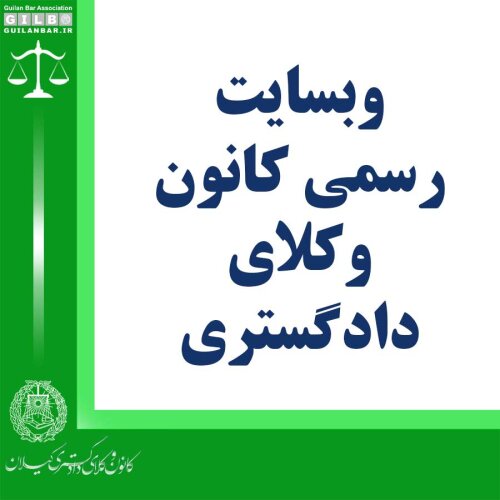Best Bail Bond Service Lawyers in Rasht
Share your needs with us, get contacted by law firms.
Free. Takes 2 min.
List of the best lawyers in Rasht, Iran
About Bail Bond Service Law in Rasht, Iran
Bail Bond Service in Rasht, Iran, operates within the framework of the Iranian Islamic Penal Code and the Code of Criminal Procedure. When an individual is arrested and taken into custody, the court may grant them provisional release by requiring bail or a surety-financial or otherwise-to ensure their attendance at future court proceedings. Bail bonds can be posted through personal guarantees, financial securities, or property pledges. The process is overseen by local judicial authorities, and the specific procedure can vary based on the nature of the alleged offense and the discretion of the judge involved. Unlike some countries that have commercial bail bond agencies, in Iran, the procedure is directly handled by the judicial system, with family members or acquaintances usually acting as sureties.
Why You May Need a Lawyer
Navigating the bail bond process in Rasht can be complex, especially for those unfamiliar with legal procedures or facing serious charges. Some common situations where legal help may be necessary include:
- Understanding eligibility for provisional release or bail
- Ensuring the amount or conditions set by the court are fair and reasonable
- Assisting with the preparation and submission of financial guarantees or property deeds
- Negotiating for alternative forms of security if cash or property is not available
- Advocating for reduction of bail or challenging its necessity
- Addressing issues of rejected bail applications or extensions of detention
- Recovering the bail amount or property after the case is resolved
A lawyer familiar with Rasht's legal system can guide you through the process, protect your rights, and help achieve a more favorable outcome.
Local Laws Overview
Under Iranian law, the process of granting and administering bail is governed by the Code of Criminal Procedure. Key aspects relevant to Rasht include:
- Bail is typically offered for offenses that do not pose a major threat to public safety or national security
- The court has wide discretion in setting bail amounts and conditions, which may vary on a case-by-case basis
- Bail can take the form of cash, immovable property (like land or a house), or surety from a trusted individual
- If the accused fails to appear in court, the bail is forfeited and legal action may be taken against the surety
- Repeat offenders or those accused of serious crimes may face stricter bail requirements or may not be eligible for release
- The return of bail after a case concludes must be formally initiated, and any damages or fines will be deducted before release
Frequently Asked Questions
What is bail in the context of Rasht, Iran?
Bail is a legal guarantee provided to the court to ensure an accused person's appearance at future court dates. It can be provided in cash, property, or personal guarantee.
Who can post bail for an accused individual?
Family members, friends, or other trusted individuals can act as sureties and post bail on behalf of the accused, provided they meet court requirements.
Are commercial bail bond agencies available in Rasht?
No, Iran does not permit private or commercial bail bond agencies. All bail arrangements are processed directly through the judiciary.
How is the bail amount determined?
A judge sets the bail amount based on the severity of the charge, the accused's background, flight risk, and any potential threat to the community.
Can bail be denied?
Yes, for serious offenses or if the accused is considered a flight risk, the judge may deny bail and order continued detention.
What forms of property are acceptable as collateral for bail?
Typically, real estate deeds such as land or a house are accepted, but the property must be free of liens and meet the value required by the court.
What happens if the accused does not appear in court?
If the accused fails to appear, the posted bail is forfeited, and the court may seize the collateral or take action against the surety.
How can bail be recovered after the case is closed?
After all court proceedings are complete, an application for the return of bail must be filed. Any fines or damages will be deducted before the remainder is returned.
Is it possible to appeal a bail decision?
Yes, through legal counsel, you can appeal the court's bail decision if you believe the amount or denial is unjustified.
Can a lawyer help in reducing bail or changing its conditions?
Yes, an experienced lawyer can petition the court to modify the bail amount or conditions, especially if circumstances change or new evidence arises.
Additional Resources
If you need further assistance or information regarding bail bond services in Rasht, consider the following resources:
- Judiciary of Iran - Rasht Branch: The main legal authority handling bail applications and related proceedings
- Local Bar Association of Rasht: Offers listings of qualified legal professionals who specialize in criminal defense and bail matters
- Legal Aid Organizations: Provide guidance and sometimes pro bono representation for those unable to afford private counsel
- Police Stations and Detention Centers: Can direct you to the appropriate judicial office for bail-related questions
Next Steps
If you or a loved one is involved in a case requiring bail in Rasht, consider these steps:
- Contact a local lawyer with experience in criminal law and bail bond services as soon as possible
- Gather relevant documents, including identification, property deeds, and any court summons or notices
- Consult with the judiciary or court office to understand the specific bail process and requirements for your case
- Prepare all necessary guarantees or sureties as stipulated by the court
- Attend all scheduled hearings and comply fully with bail conditions to avoid forfeiture
- Request a formal return of bail once the case concludes, through your lawyer or directly at the relevant court
Timely action and professional legal guidance are crucial in navigating the bail bond process effectively and safeguarding your rights.
Lawzana helps you find the best lawyers and law firms in Rasht through a curated and pre-screened list of qualified legal professionals. Our platform offers rankings and detailed profiles of attorneys and law firms, allowing you to compare based on practice areas, including Bail Bond Service, experience, and client feedback.
Each profile includes a description of the firm's areas of practice, client reviews, team members and partners, year of establishment, spoken languages, office locations, contact information, social media presence, and any published articles or resources. Most firms on our platform speak English and are experienced in both local and international legal matters.
Get a quote from top-rated law firms in Rasht, Iran — quickly, securely, and without unnecessary hassle.
Disclaimer:
The information provided on this page is for general informational purposes only and does not constitute legal advice. While we strive to ensure the accuracy and relevance of the content, legal information may change over time, and interpretations of the law can vary. You should always consult with a qualified legal professional for advice specific to your situation.
We disclaim all liability for actions taken or not taken based on the content of this page. If you believe any information is incorrect or outdated, please contact us, and we will review and update it where appropriate.









